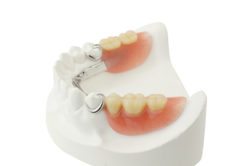 When a patient loses one tooth, we may suggest a bridge or a single tooth dental implant. However, occasionally we meet patients with advanced tooth loss, losing a majority or even all of their teeth. In these situations, patients may need a prosthetic, such as a full or partial denture.
When a patient loses one tooth, we may suggest a bridge or a single tooth dental implant. However, occasionally we meet patients with advanced tooth loss, losing a majority or even all of their teeth. In these situations, patients may need a prosthetic, such as a full or partial denture.
Try Our Quiz on Full and Partial Dentures
- True or False: Advanced tooth loss can hurt your overall health.
- True or False: Partials address advanced tooth loss.
- True or False: A full can replace all of your lost teeth.
- True or False: We can support them with dental implants.
Answer Key
- True. Losing a majority of your teeth can mean relying main on soft foods for meals, depriving yourself of nutrients. You may also have trouble communicating clearly or may simply feel embarrassed to engage in social interactions. Replacing your missing teeth can improve your self-confidence and help you enjoy improved overall health.
- True. A partial contains metal clasps that attach the remaining natural teeth, anchoring the new teeth in place. The teeth will be made from porcelain, a lifelike material that can be shaded to match your smile. We can use the partial to address multiple missing teeth, even if they are spread out across your arch.
- True. If you’ve lost all of your teeth, we can create a custom-made full denture. There will be an acrylic base made to mimic the appearance of gum tissue, as well as a full row of lifelike porcelain teeth. The denture will be held in place with natural suction.
- True. We can place multiple dental implants that the completed denture can attach to, providing greater security.
To learn more, schedule a consultation online, or call our office today at (847) 230-9703.
